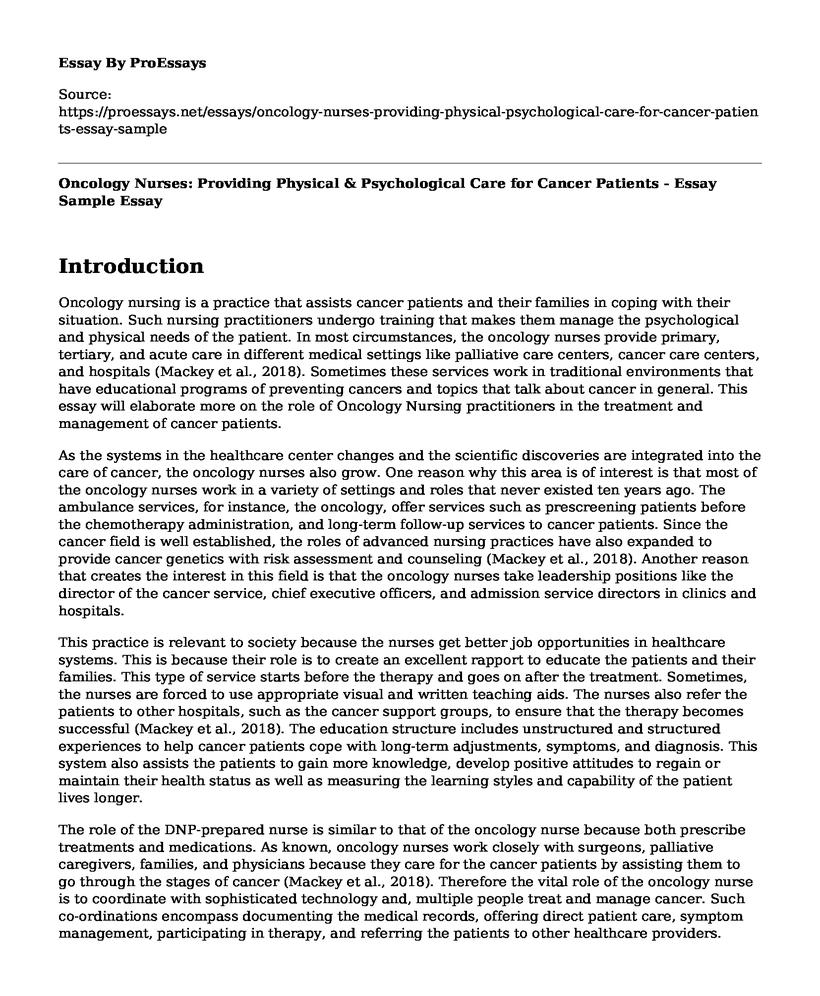Introduction
Oncology nursing is a practice that assists cancer patients and their families in coping with their situation. Such nursing practitioners undergo training that makes them manage the psychological and physical needs of the patient. In most circumstances, the oncology nurses provide primary, tertiary, and acute care in different medical settings like palliative care centers, cancer care centers, and hospitals (Mackey et al., 2018). Sometimes these services work in traditional environments that have educational programs of preventing cancers and topics that talk about cancer in general. This essay will elaborate more on the role of Oncology Nursing practitioners in the treatment and management of cancer patients.
As the systems in the healthcare center changes and the scientific discoveries are integrated into the care of cancer, the oncology nurses also grow. One reason why this area is of interest is that most of the oncology nurses work in a variety of settings and roles that never existed ten years ago. The ambulance services, for instance, the oncology, offer services such as prescreening patients before the chemotherapy administration, and long-term follow-up services to cancer patients. Since the cancer field is well established, the roles of advanced nursing practices have also expanded to provide cancer genetics with risk assessment and counseling (Mackey et al., 2018). Another reason that creates the interest in this field is that the oncology nurses take leadership positions like the director of the cancer service, chief executive officers, and admission service directors in clinics and hospitals.
This practice is relevant to society because the nurses get better job opportunities in healthcare systems. This is because their role is to create an excellent rapport to educate the patients and their families. This type of service starts before the therapy and goes on after the treatment. Sometimes, the nurses are forced to use appropriate visual and written teaching aids. The nurses also refer the patients to other hospitals, such as the cancer support groups, to ensure that the therapy becomes successful (Mackey et al., 2018). The education structure includes unstructured and structured experiences to help cancer patients cope with long-term adjustments, symptoms, and diagnosis. This system also assists the patients to gain more knowledge, develop positive attitudes to regain or maintain their health status as well as measuring the learning styles and capability of the patient lives longer.
The role of the DNP-prepared nurse is similar to that of the oncology nurse because both prescribe treatments and medications. As known, oncology nurses work closely with surgeons, palliative caregivers, families, and physicians because they care for the cancer patients by assisting them to go through the stages of cancer (Mackey et al., 2018). Therefore the vital role of the oncology nurse is to coordinate with sophisticated technology and, multiple people treat and manage cancer. Such co-ordinations encompass documenting the medical records, offering direct patient care, symptom management, participating in therapy, and referring the patients to other healthcare providers.
Conclusion
Ideally, the family and the patient directly contact the oncology nurse even if they are under the care of another medical practitioner. This is because many cancer patients travel a long distance, and through their journey, they always need someone to talk to them. This allows regular emotional support, continuous patient communication, and the recognition of emergencies. The reason behind this is that the oncology nurses offer support, encourage, and show love to the patient. In most cases, these nurses are also involved in education and preventive care.
References
Mackey, H., Noonan, K., Sheldon, L. K., Singer, M., & Turner, T. (2018). Oncology Nurse Practitioner Role: Recommendations From the Oncology Nursing Society's Nurse Practitioner Summit. Clinical Journal of Oncology Nursing, 22(5), 516-522. doi: 10.1188/18.cjon.516-522
Cite this page
Oncology Nurses: Providing Physical & Psychological Care for Cancer Patients - Essay Sample. (2023, Feb 27). Retrieved from https://proessays.net/essays/oncology-nurses-providing-physical-psychological-care-for-cancer-patients-essay-sample
If you are the original author of this essay and no longer wish to have it published on the ProEssays website, please click below to request its removal:
- Inferential Statistics
- The Societal Impact on Fibromyalgia Patients
- Position Paper on the Benefits and Risks of Statin Drugs Essay
- Nurses' Termination: Code of Ethics & Nurse Practice Act
- Opioid Crisis: Declared a State Emergency by US President - Essay Sample
- Essay Sample on Ageing: Preparing for Physical Challenges & Modifying Lifestyle
- Paper Example on Physical Assessment: Palpatory Skills For Musculoskeletal System







